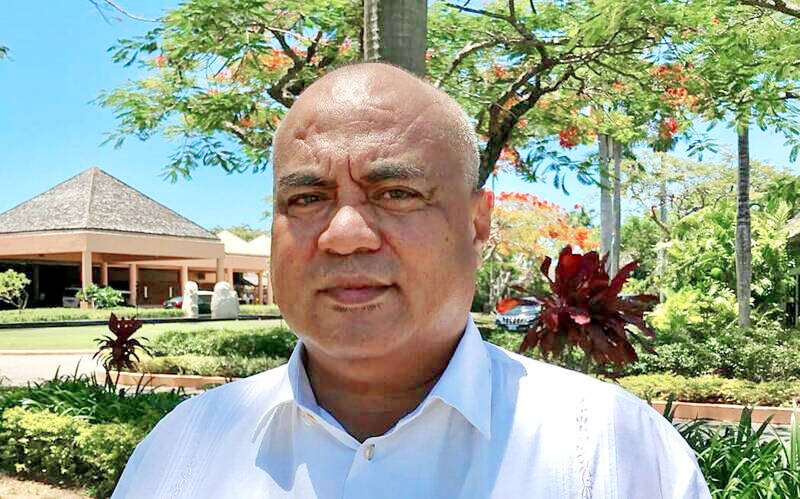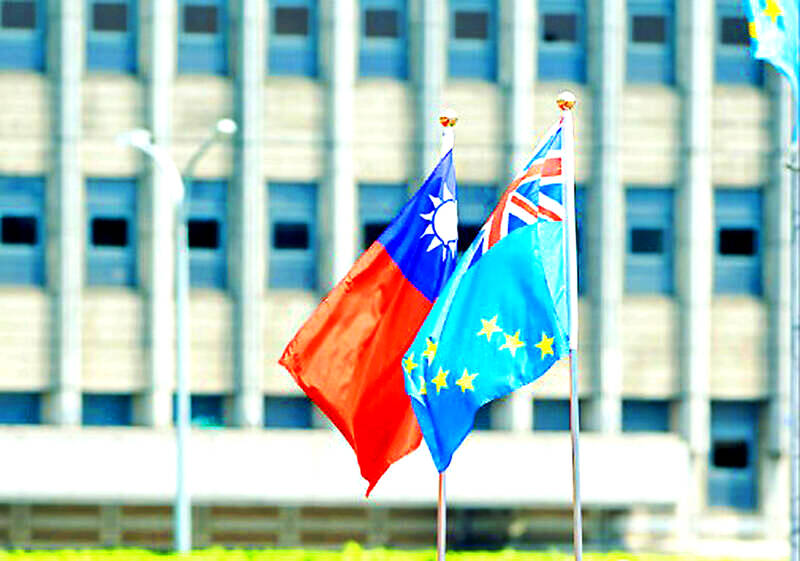Taiwan has received assurances from newly elected Tuvaluan Prime Minister Feleti Teo that his administration would continue diplomatic relations between the two nations, the Ministry of Foreign Affairs said yesterday.
Teo’s comments came after media reports said that the Pacific island ally could switch allegiance to Beijing in the wake of an election last month.
Tuvalu yesterday announced that former attorney general Teo was its new prime minister, after he was elected unopposed by lawmakers.

Photo: screen grab from Teo’s X account
Following the announcement, Ambassador to Tuvalu Andrew Lin (林東亨) congratulated Teo and Tuvaluan Governor-General Tofiga Falani on behalf of President Tsai Ing-wen (蔡英文), the Taiwanese government and its people, the ministry said.
The new prime minister has visited Taiwan several times and is known for his Taiwan-friendly stance, it said.
Teo told Lin following his election victory that there is a “consensus” in Tuvalu to maintain diplomatic ties with Taiwan, the ministry said.

Photo: Taipei Times
His new administration would continue to work hand-in-hand with Taiwan to promote cooperation projects that benefit people on both sides, the ministry quoted Teo as saying.
His new administration would also continue to uphold Funafuti’s long-held stance of supporting Taiwan’s international participation, Teo said.
Meanwhile, the ministry announced that Deputy Minister of Foreign Affairs Tien Chung-kwang (田中光) would visit Tuvalu in the capacity of Tsai’s special envoy to congratulate Teo.
Teo is a former executive director of the Western and Central Pacific Fisheries Commission — more commonly known as the Pacific Tuna Commission.
He became a lawmaker after winning the election in Niutao District, unseating his brother and former parliament speaker Samuelu Teo.
Yesterday’s election to determine the new prime minister was due to be held a few days after the nation chose its 16 new members of parliament on Jan. 26, but stormy weather and rough seas prevented several lawmakers from traveling by boat from outer islands to the capital to select a new leader.
There were concerns before Feleti Teo was selected yesterday, after outgoing Tuvaluan minister of finance Seve Paeniu, who secured a seat on Jan. 26 and was said to be a contender for prime minister, told Reuters last month that Tuvalu’s ties with Taiwan “need to be debated and reviewed in the new parliament.”
Paeniu said that the Tuvaluan electorate wanted more financial support from the international community to help the island nation address climate change and other issues.
In contrast, outgoing Tuvaluan prime minister Kausea Natano, who had pledged support for Taiwan, lost his seat in the election.
The ministry had rejected reports suggesting Tuvalu might follow Nauru in severing diplomatic ties with Taiwan.
“The majority of the known newly elected members of parliament are supportive of the Taiwan-Tuvalu relationship,” the ministry said, adding that those people “maintain a friendly stance [toward Taiwan] and back the continuation of the ties between the two countries.”
The election in Tuvalu, a tiny island nation with a population of about 11,000, was closely watched following Nauru’s diplomatic switch from Taipei to Beijing on Jan. 15, shortly after Vice President William Lai (賴清德) won the presidential election.
The ministry has accused Beijing of poaching Nauru, calling the move “a retaliatory act against democratic values and a clear challenge to the stability of the international order.”

FREEDOM OF NAVIGATION: The UK would continue to reinforce ties with Taiwan ‘in a wide range of areas’ as a part of a ‘strong unofficial relationship,’ a paper said The UK plans to conduct more freedom of navigation operations in the Taiwan Strait and the South China Sea, British Secretary of State for Foreign, Commonwealth and Development Affairs David Lammy told the British House of Commons on Tuesday. British Member of Parliament Desmond Swayne said that the Royal Navy’s HMS Spey had passed through the Taiwan Strait “in pursuit of vital international freedom of navigation in the South China Sea.” Swayne asked Lammy whether he agreed that it was “proper and lawful” to do so, and if the UK would continue to carry out similar operations. Lammy replied “yes” to both questions. The

‘OF COURSE A COUNTRY’: The president outlined that Taiwan has all the necessary features of a nation, including citizens, land, government and sovereignty President William Lai (賴清德) discussed the meaning of “nation” during a speech in New Taipei City last night, emphasizing that Taiwan is a country as he condemned China’s misinterpretation of UN Resolution 2758. The speech was the first in a series of 10 that Lai is scheduled to give across Taiwan. It is the responsibility of Taiwanese citizens to stand united to defend their national sovereignty, democracy, liberty, way of life and the future of the next generation, Lai said. This is the most important legacy the people of this era could pass on to future generations, he said. Lai went on to discuss

AMENDMENT: Climate change is expected to increase the frequency of high-temperature days, affecting economic productivity and public health, experts said The Central Weather Administration (CWA) is considering amending the Meteorological Act (氣象法) to classify “high temperatures” as “hazardous weather,” providing a legal basis for work or school closures due to extreme heat. CWA Administrator Lu Kuo-chen (呂國臣) yesterday said the agency plans to submit the proposed amendments to the Executive Yuan for review in the fourth quarter this year. The CWA has been monitoring high-temperature trends for an extended period, and the agency contributes scientific data to the recently established High Temperature Response Alliance led by the Ministry of Environment, Lu said. The data include temperature, humidity, radiation intensity and ambient wind,

SECOND SPEECH: All political parties should work together to defend democracy, protect Taiwan and resist the CCP, despite their differences, the president said President William Lai (賴清德) yesterday discussed how pro-Taiwan and pro-Republic of China (ROC) groups can agree to maintain solidarity on the issue of protecting Taiwan and resisting the Chinese Communist Party (CCP). The talk, delivered last night at Taoyuan’s Hakka Youth Association, was the second in a series of 10 that Lai is scheduled to give across Taiwan. Citing Taiwanese democracy pioneer Chiang Wei-shui’s (蔣渭水) slogan that solidarity brings strength, Lai said it was a call for political parties to find consensus amid disagreements on behalf of bettering the nation. All political parties should work together to defend democracy, protect Taiwan and resist